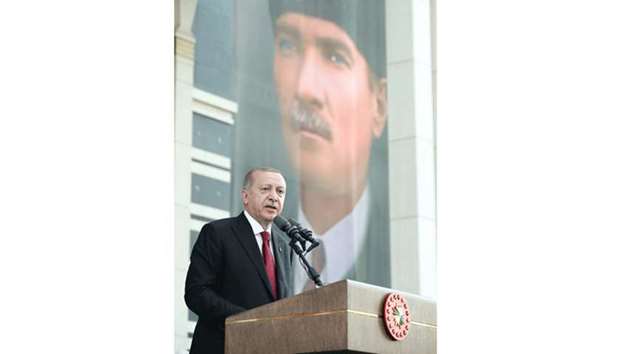Assuming the new executive presidency he has long fought to establish, Erdogan took the oath of office in parliament before addressing international leaders gathered at the presidential palace in Ankara.
“We, as Turkey and as the Turkish people, are making a new start here today,” he told the dignitaries and thousands of guests. “We are leaving behind the system that has in the past cost our country a heavy price in political and economic chaos.”
He took his oath in parliament for a new five-year term after his June election victory, followed by a ceremony at the presidential palace attended by dozens of world leaders marking the transition to the new executive presidency system.
“We will work to be deserving of not just those who voted for us but the 81mn,” Erdogan said, adding that Turkey had paid a “heavy price” with its old system of government.
Calling it the “most important day in our country’s history”, he said: “With the executive presidency system, we are switching to a new government model well beyond our trials during a nearly 150-year-long search for democracy and 95 years of republic.”
Erdogan, 64, says that the new, powerful executive presidency is vital to drive economic growth, ensure security after a failed 2016 military coup and safeguard Turkey from conflict across its southern border in Syria and Iraq.
“We are embarking on this road by using this opportunity as best we can for a strong parliament, strong government and strong Turkey,” the president said.
The introduction of the new presidential system marks the biggest overhaul of governance since the republic was established on the ruins of the Ottoman Empire nearly a century ago.
The post of prime minister has been scrapped and the president will now be able to select his own cabinet, regulate ministries and remove civil servants, all without parliamentary approval.
Erdogan’s supporters see the changes as just reward for a leader who has put Islamic values at the core of public life, championed the pious working classes and overseen years of strong economic growth.
Opponents say the move marks a lurch to authoritarianism, accusing Erdogan of eroding the secular institutions set up by modern Turkey’s founder, Mustafa Kemal Ataturk, and driving it further from Western values of democracy and free speech.
Marc Pierini, a former EU ambassador to Turkey and visiting scholar at Carnegie Europe, said that Erdogan’s new powers would effectively make him a “super-executive president”.
“Most powers will be concentrated in his hands, there will no longer be a prime minister, and almost none of the checks and balances of liberal democracies will be present. In other words, Turkey will be an institutionalised autocracy.”
Erdogan was due to name a streamlined cabinet of 16 ministers last night after the ceremony at the presidential palace, which state news agency Anadolu said was attended by Venezuelan President Nicolas Maduro, Russian Prime Minister Dmitry Medvedev, and Sudanese President Omar Hassan al-Bashir, who is wanted for war crimes by the International Criminal Court.
No major Western leader featured on a list of 50 presidents, prime ministers and other high-ranking guests.
Turkey is a member of the Western military alliance, North Atlantic Treaty Organisation (Nato), but it has been at odds with the United States over military strategy in Syria and with the European Union over Ankara’s large-scale purges of state institutions, armed forces, police and media following the failed coup.

